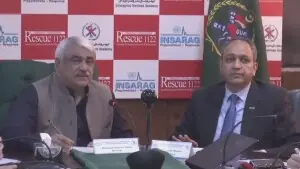Pakistani kids are not okay
5 min readThe great population debate is premised on the standard argument that fewer people will mean less poverty and greater prosperity. Because that sounds both logical and conceptual, we all agree with it in theory, but rarely does it move our hearts.
We all know that Pakistan, at 221 million people, is the fifth-most populous country in the world, and is growing at two percent a year. We are also aware that our women produce more children over a lifetime, on average, than women in India and Bangladesh. This is why 60 percent of our population is under 30 years of age.
Having such a large young population is said to be an advantage but that holds only if this youth is grounded, balanced and skilled. This is not necessarily the case in Pakistan and while we peg this to a lack of education, I wager that there is a lot more at play. They are, I find, growing up with their health—mental, physical and emotional—deeply affected.

After spending 15 years in rural communities in upper Sindh and getting to know families closely, I have been struck less by the statistical and more by the human face of the population explosion.
In a typical village (and villages are where almost two-thirds of our population lives), children are more or less independent from the time they can walk. As they begin walking, they wander off alone to the nearby homes of aunts, uncles and neighbours. By the age of about four, they begin venturing further. And after six, there's pretty much no place in the village that's off limits.
As mothers produce babies nearly every year, they usually only have enough physical affection for the youngest (the infant)
This means that children are being exposed to all sorts of things at a most impressionable age, including gambling dens, idle gossip, endless movies at tea shops and frequent community fights. It is worrying that these children see such extreme negativity as normal. And they are not being given much of a moral lens though which to view this world of theirs.
As mothers produce babies nearly every year, they usually only have enough physical affection for the youngest (the infant). Otherwise, they are overwhelmed with cooking, cleaning, doing laundry, and income-generating work like livestock farming, crop farming and embroidery. Fathers either struggle to make ends meet or have given their lives up to gambling and drugs and usually have little to do with home management.

Therefore, mothers rush through bathing toddlers and smaller children in order to get on with their endless list of chores for the day. Children receive little physical affection from their mothers after babyhood, leaving many of them deprived and starved for attention. Obviously, this lack of emotional security can cause all manner of problems later in life.
Many development programmes feel the need to enlighten women about basic children health such as handwashing, tackling worms and lice. In truth though, the women know far better how to get rid of parasites with traditional methods and by accessing mainstream help as well. It is time and energy that they are short on. As a result, their children are never in the best of health. Hygiene is poor and never instilled as a habit and therefore this continues into adulthood. We are thus not producing a healthy population that can become a strength and an economic asset.
Even the smallest child will learn to eat rapidly, often using both hands, and snatch what they can from their siblings
At feeding time, women will usually put a large dish filled with rice and potatoes at the center of a charpai and children will clamber up and jostle for a place at the tray. She has cooked and placed the food out there but rarely has the time to supervise the eating process to ensure all the children are well-fed. Even the smallest child will learn to eat rapidly, often using both hands, and snatch what they can from their siblings. Frankly, in that setting, if they don't put up a fight, they're going to go hungry. It is small wonder then that we see children (even adults) scrambling and jostling for food at charity feedings and festivals because this is a way they have always seen as normal.

Sleep, which is vital to health, especially of a growing child, is also badly affected. Women put the charpais out at sun-down but rarely call out to the children for bedtime. Instead, they sit nursing the baby or tending to other errands. When the children are tired, they come back and fall into bed without anything akin to a bedtime routine.
Before dawn, the household is stirring as women wake early to tend the cattle and men head out to work. Children also rise to that routine as the rising sun, buzzing flies and sounds of other children disturb their sleep. That means they don't sleep more than eight hours at the very best.
Children without proper hygiene, poor nourishment, inadequate sleep, scant attention and little protection are growing up as our next generation
Women everywhere instinctively dream the brightest of dreams for their children. In all my conversations with women across villages, mothers wish to see their children grow up as responsible, kind and capable members of society.
What many families are not seeing though is the immense burden of work large families puts on the woman and how that takes away from any meaningful contribution she can make to her child's upbringing. Children without proper hygiene, poor nourishment, inadequate sleep, scant attention and little protection are growing up as our next generation.
Our task is to support families to see that connection between the way their offspring are being raised and how much further that is taking parents from the dreams they dream for their children.
Therein lies the real challenge to the population issue. The government can, and indeed has, put in dozens of family planning programmes that provide free contraception and surgical procedures, but unless our families start seeing why small is better, none of those efforts will have the intended impact.
Naween Mangi is the founder & managing trustee of the Ali Hasan Mangi Memorial Trust
For the latest news, follow us on Twitter @Aaj_Urdu. We are also on Facebook, Instagram and YouTube.
























Comments are closed on this story.